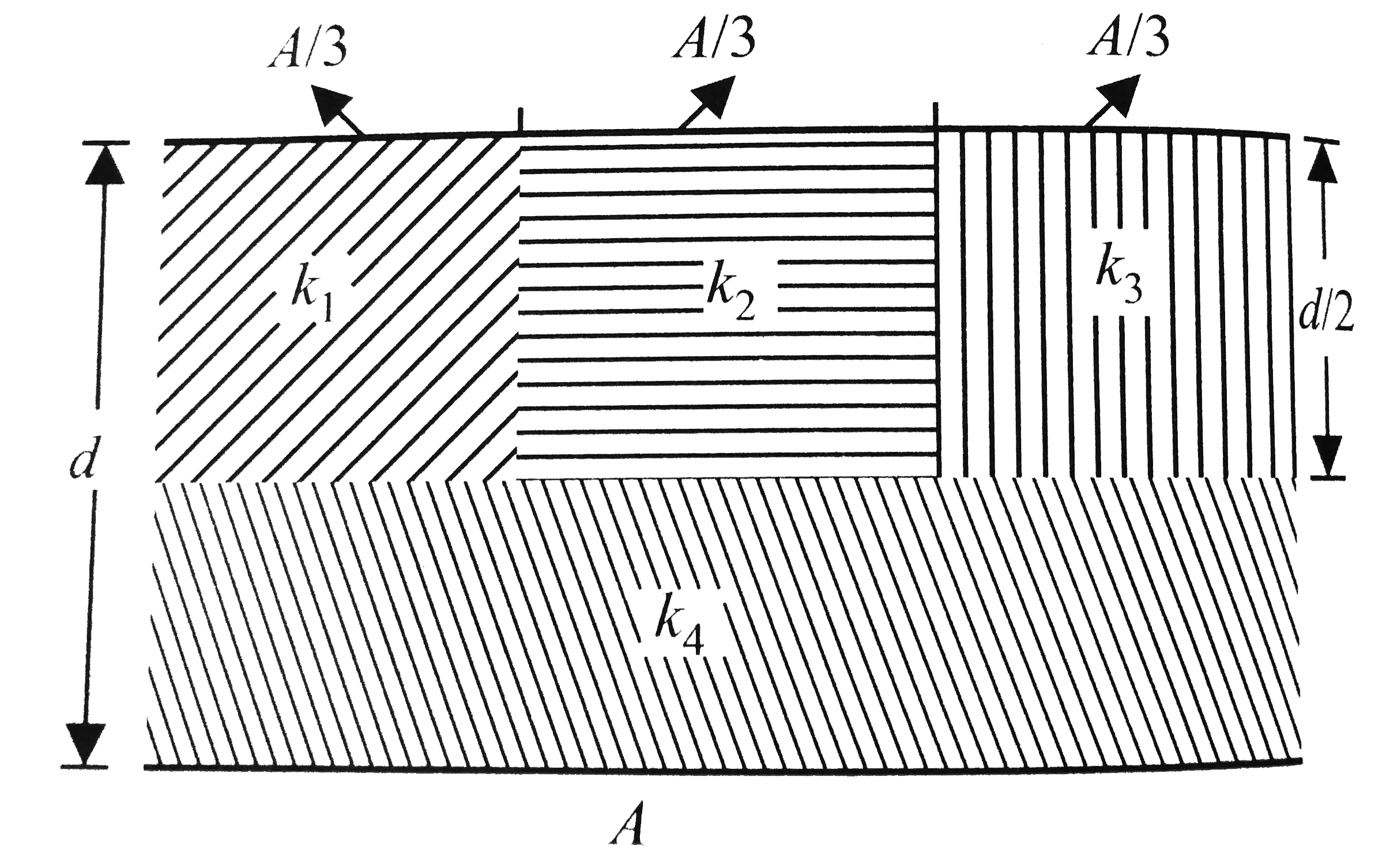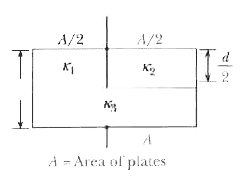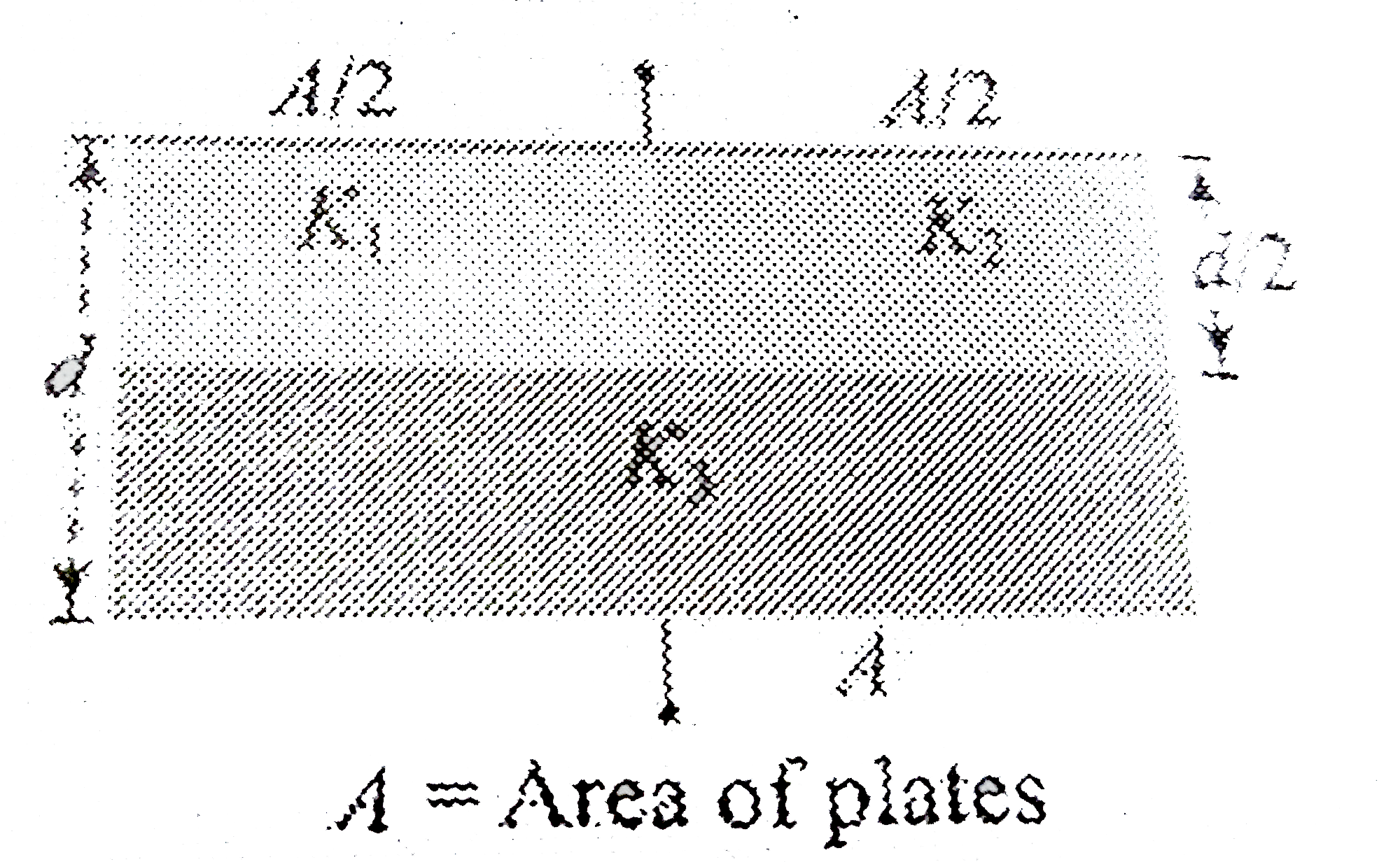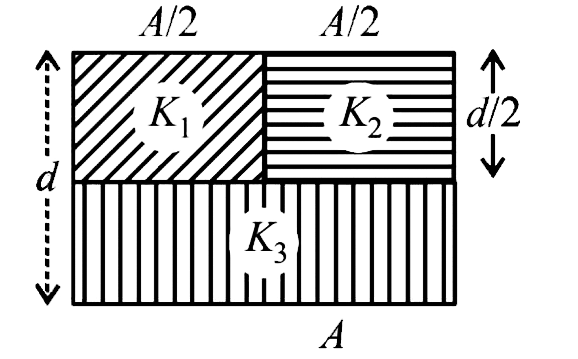A parallel-plate capacitor of area A, plate separation d and capacitance C is filled with four dielectric material having dielectric constant and as shown in the figure. If a single dielectric material is to be used to have the same capacitance C in this capacitor, then its dielectric constant k is given by

The correct Answer is:C
Here,
Given system of and can be simplified as

Suppose,
Related Playlists
- BOOK - MTG GUIDECHAPTER - ELECTROSTATICSEXERCISE - NEET VITALS18videos
ELECTROSTATICS
- BOOK - MTG GUIDECHAPTER - ELECTRONIC DEVICESEXERCISE - AIPMT/NEET (MCQs)42videos
ELECTRONIC DEVICES
- BOOK - MTG GUIDECHAPTER - MAGNETIC EFFECTS OF CURRENT AND MAGNETISMEXERCISE - AIPMT/NEET (MCQs)48videos
MAGNETIC EFFECTS OF CURRENT AND MAGNETISM
Knowledge Check
- Question 1 - Select One
A parallel -plate capacitor of area A, plate separation d and capacitance C is filled with four dielectric materials having dielectric constant k1,k2,k3 and k4 as shown in the figure below. If a single dielectric materical is to be used to have the same capacitance C in this capacitor, then its dielectric constant k is given by
 A2k=3k1+k2+k3+1k4B1k=1k1+1k2+1k1=32k4Ck=k1+k2+k+3k4Dk=23(k1+k2+k3)+2k4
A2k=3k1+k2+k3+1k4B1k=1k1+1k2+1k1=32k4Ck=k1+k2+k+3k4Dk=23(k1+k2+k3)+2k4 - Question 1 - Select One
A parallel -plate capacitor of area A, plate separation d and capacitance C is filled with four dielectric materials having dielectric constant k1,k2,k3 and k4 as shown in the figure below. If a single dielectric materical is to be used to have the same capacitance C in this capacitor, then its dielectric constant k is given by
 A2k=3k1+k2+k3+1k4B1k=1k1+1k2+1k3+32k4Ck=k1+k2+k3+3k4Dk=23(k1+k2+k3)+2k4
A2k=3k1+k2+k3+1k4B1k=1k1+1k2+1k3+32k4Ck=k1+k2+k3+3k4Dk=23(k1+k2+k3)+2k4 - Question 1 - Select One
A parallel plate capacitor of area A, plate separation d and capacitance C is filled with four dielectric materials hving dielectric constants K1,K2,K3 and K4 as shown in the figure below. If a single dielectric material is to be used to have the same capacitance c in this capacitor, then its dielectric constant K is given by
 AK=K1+K2+K3+3K4BK=23(K1+K2+K3)+2K4C2K=3K1+K2+K3+1K4D1K=1K1+1K2+1K3+32K4
AK=K1+K2+K3+3K4BK=23(K1+K2+K3)+2K4C2K=3K1+K2+K3+1K4D1K=1K1+1K2+1K3+32K4 - Question 1 - Select One
A parallel plate capacitor of area A, plate separation d and capacitance C is filled with three different dielectric materials having dielectric constants k1k2andk3 as shown in the following figure. If a single dielectric material is to be used to have the same capacitance C in this capacitor then its dielectric constant k is given by
 A1k=1k1+1k2+12k3B1k=1k1+k2+12k3Ck=k1k2k1+k2+2k3Dk=k1k3k1+k3+k2k3k2+k1
A1k=1k1+1k2+12k3B1k=1k1+k2+12k3Ck=k1k2k1+k2+2k3Dk=k1k3k1+k3+k2k3k2+k1 - Question 1 - Select One
A parallel plate capacitor of area A, plate separation d and capacitance C is filled with three different dielectric materials having dielectric constants k1,k2 and k3 as shown. If a single dielectric naterial is to be used have the same capacitance C in this capacitor, then its dielectric constant k is given by
 A1k=1k2+1k2+12k3B1k=1k2+k2+12k3Ck=k1k2k1+k2+2k3Dk=k1+k2+2k3
A1k=1k2+1k2+12k3B1k=1k2+k2+12k3Ck=k1k2k1+k2+2k3Dk=k1+k2+2k3 - Question 1 - Select One
A parallel plate capacitor of area A, plate separation d and capacitance C is filled with three different dielectric materials having dielectric constants k1, k2 and k3 as shown. If a single dielectric material is to be used to have the same capacitance C in this capacitor, then its dielectic constant k is given by
 A(a) 1K=1K1+1K2+12K3B(b) 1K=1K1+K2+12K3C(c) K=K1K2K1+K2+2K3D(d) K=K1+K2+2K3
A(a) 1K=1K1+1K2+12K3B(b) 1K=1K1+K2+12K3C(c) K=K1K2K1+K2+2K3D(d) K=K1+K2+2K3
Similar Questions
A parallel plate capacitor of area A, plate separation d and capacitance C is filled with four dielectric materials hving dielectric constants K1,K2,K3 and K4 as shown in the figure below. If a single dielectric material is to be used to have the same capacitance c in this capacitor, then its dielectric constant K is given by
 View Solution
View SolutionA parallel plate capacitor of area A, plate separation d and capacitance C is filled with three different dielectric materials having dielectric constants k1, k2 and k3 as shown. If a isngle dielectric material is to be used to have the same capacitance C in this capacitor, then its dielectic constant k is given by
 View Solution
View SolutionA parallel plate capacitor of area A, plate separation d and capacitance C is filled with three different dielectric materials having dielectric constant K1,K2 and K3 as shown in fig. If a single dielectric material is to be used to have the same effective capacitance as the above combination then its dielectric constant K is given by :
View SolutionAir filled capacitor of capacitance 2μF is filled with three dielectric material of dielectric constant K1=4,K2=4 and K3=6 as shown in the figure . The new capacitance of the capacitor is
View Solution

